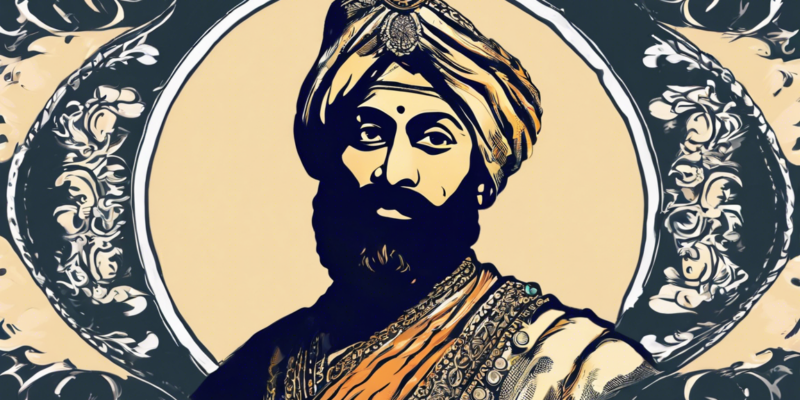Introduction
Chhatrapati Shivaji Maharaj, also known as Shivaji Bhonsle, was a Maratha warrior king who established the Maratha Empire in Western India in the 17th century. He is considered one of the greatest warriors and strategists in Indian history, known for his military acumen, administrative skills, and his vision for a strong and independent Maratha kingdom. Shivaji Maharaj’s legacy continues to inspire generations of Indians, and his principles of governance and leadership remain relevant even today. In this article, we will explore the life, achievements, and enduring legacy of Chhatrapati Shivaji Maharaj.
Early Life and Rise to Power
Shivaji Maharaj was born in 1630 in the hill fort of Shivneri in present-day Maharashtra, India. He was born to Shahaji Bhonsle, a prominent Maratha noble, and Jijabai, a devout Hindu mother who instilled in him a sense of duty and righteousness. Shivaji Maharaj inherited his father’s jagir (land holdings) and forts at a young age, but he showed early signs of leadership and military prowess.
In his youth, Shivaji Maharaj undertook a series of successful military campaigns to establish his authority and expand his territory. He captured the strategically important forts of Torna and Raigad, which became the capital of his kingdom. Through a combination of military conquests, strategic alliances, and shrewd diplomacy, Shivaji Maharaj gradually expanded his influence over large parts of Western India.
Military Achievements and Strategies
Shivaji Maharaj was a brilliant military strategist who revolutionized the art of guerilla warfare in India. He developed a well-organized military system known as the “Ashta Pradhan” (Council of Eight Ministers) to govern his empire efficiently. Shivaji Maharaj’s navy, consisting of well-armed ships, challenged the supremacy of the Portuguese and British naval forces along the Konkan coast.
One of Shivaji Maharaj’s most audacious military feats was the capture of the impregnable fort of Kondana (later renamed Sinhagad) in 1647. His lightning raids on Mughal territories and the plunder of their rich provinces earned him the title of “Chhatrapati” or paramount sovereign. Shivaji Maharaj’s innovative use of forts, cavalry, and infantry laid the foundation for the Maratha Empire’s military success.
Administrative Reforms and Governance
Shivaji Maharaj was not only a skilled warrior but also a visionary ruler who implemented several administrative reforms to ensure the welfare of his subjects. He promoted religious tolerance, abolished unjust taxes, and established a decentralized administrative system that empowered local chieftains. Shivaji Maharaj’s judicial system, known as the “Nyayalaya,” provided speedy justice to the common people and upheld the rule of law.
Under his rule, trade and commerce flourished, infrastructure projects such as roads and water reservoirs were undertaken, and agriculture was promoted through efficient land revenue systems. Shivaji Maharaj’s emphasis on good governance and social welfare endeared him to his subjects and earned him the reputation of a “People’s King.”
Legacy and Impact
The legacy of Chhatrapati Shivaji Maharaj continues to inspire millions of Indians, especially in Maharashtra, where he is revered as a folk hero and symbol of Maratha pride. His valor, integrity, and commitment to the welfare of his people have made him a role model for leaders across the political spectrum. Several cities, institutions, and monuments in India are named after Shivaji Maharaj, underscoring his enduring influence on Indian society.
Shivaji Maharaj’s military strategies, administrative innovations, and commitment to social justice have been studied by scholars and historians around the world. His legacy also played a significant role in the rise of the Maratha Empire and the eventual decline of Mughal dominance in India. Shivaji Maharaj’s emphasis on self-rule, nationalism, and cultural identity continues to resonate with contemporary debates on Indian history and politics.
Frequently Asked Questions (FAQs)
1. What was Shivaji Maharaj’s religious policy?
Shivaji Maharaj was known for his policy of religious tolerance. He respected all faiths and ensured that his subjects had the freedom to practice their religion without fear of persecution.
2. How did Shivaji Maharaj challenge the Mughal Empire?
Shivaji Maharaj launched several successful military campaigns against the mighty Mughal Empire, weakening their control over Western India and establishing an independent Maratha kingdom.
3. Why is Shivaji Maharaj called the “Father of the Indian Navy”?
Shivaji Maharaj is credited with building a strong naval force to challenge European powers in the region. His navy played a crucial role in protecting the Maratha coastline and expanding his maritime influence.
4. What is the significance of the coronation of Shivaji Maharaj as Chhatrapati?
The coronation of Shivaji Maharaj as Chhatrapati symbolized his assertion of sovereignty and independence from Mughal authority. It marked a turning point in Maratha history and established Shivaji Maharaj as a paramount sovereign.
5. How did Shivaji Maharaj inspire future generations of leaders?
Shivaji Maharaj’s principles of courage, integrity, and good governance have inspired generations of leaders in India. His legacy continues to shape the political discourse and cultural identity of Maharashtra and the larger Indian subcontinent.
Conclusion
Chhatrapati Shivaji Maharaj’s legacy as a warrior, statesman, and visionary leader remains unparalleled in Indian history. His enduring impact on the socio-political landscape of India underscores his significance as a symbol of resistance, valor, and good governance. By exploring Shivaji Maharaj’s life and achievements, we gain insights into a transformative era in Indian history and draw inspiration from his timeless ideals of justice, freedom, and self-determination.

